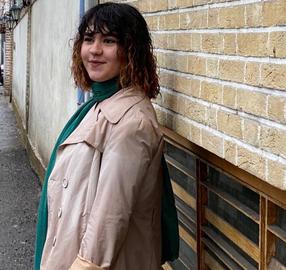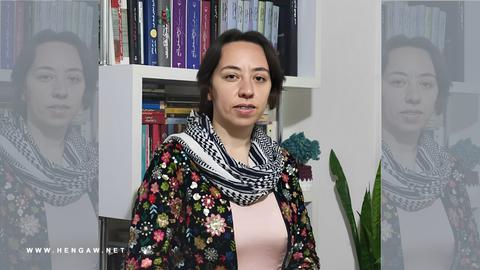Her 2020 debut novel, Daughters of Smoke and Fire, tells the story of a Kurdish woman’s search for justice and freedom in Iran. It was published simultaneously in the US, Britain and Canada, winning her many acclaims and honors.
She is Ava Homa, herself a Kurdish Iranian woman, a seasoned journalist, a human rights activist and a faculty member at California State University who now lives in the United States.
Born in January 1981, Homa grew up in Sanandaj, the provincial capital of Kurdistan province. “I grew up in a family where there were a ton of books all the time in every single room,” she says. “My parents are highly educated, and they are also readers. We had Farsi, Kurdish, and English books in the house. I got my Master’s Degree in English Language and Literature from Tehran [University] in 2005, and then I taught at Azad University for two years. And then in 2007 I got admission and a scholarship to go to the University of Windsor in Canada, and I got another degree in creative writing. I went alone — my parents are still in Kurdistan, and so I just left on my own with a student visa. I got my Master’s Degree in Canada in 2009. I wrote my first book, which was a collection of short stories, during that time in Canada.”
Rising Above Oppression and Torture
The idea of writing Daughters of Smoke and Fire took shape in her mind when letters from prison by Farzad Kamangar, a Kurdish teacher, journalist, poet and human rights activist who was executed by the Islamic Republic, were published: “In 2010, when Farzad Kamangar’s letters, written behind prison bars in Iran, went viral on the internet, I was struggling to find my way in exile in Canada. I appeared successful but had too many questions whirling in my head,” says Homa.
“Farzad’s letters, some of which are adapted in the Daughters of Smoke and Fire, shook me to the core because he showed me it was possible to find meaning even when torturers break your bones – for having a Kurdish ringtone on your cell phone, for having an accent. He embodied the truth that igniting one’s imagination was a/the way out of prison, something that no one could take away from you.
“He wrote about love, hope, and justice while being physically and psychologically tortured. Farzad defeated atrocities by refusing to give in to them; he liked to say he wouldn’t let them ‘kill him inside.’ To me, Farzad is a model of humans’ ability to rise above oppression, like Viktor Frankl, like Nelson Mandela. Being touched by his voice and his message, I realized that I had no time for doubt and self-pity. I kept on writing despite all the reasons not to.”
The Ultimate Cry for Help
One of the heart-wrenching themes in the novel is suicide by Kurdish women, a familiar subject to her since her childhood. As an adult, Homa has been very active in suicide prevention. She has created a Telegram channel and organized workshops and classes to this purpose. She says: “I work with activists to suicide prevention workshop…[Suicide] is the loudest cry for help. This is the loudest process, but it is also the biggest sign of how unhealthy Iranian society is…In fact, my protagonist and my novel, Daughters of smoke and Fire, Layla is a woman who starts by believing that her life is not worth living and that there is no way out of repression except ending it. She ends up becoming an artist and a filmmaker.”
Homa remembers a teacher of hers in Kurdistan when she was a child, a woman who always wore gloves and dresses with polo necks to hide traces of her suicide attempts. “Within the Iranian border, we have alarmingly high rates of suicides by a Kurdish woman. A lot of it is self-immolation. Suicide itself is a huge cry for help, but using fire and gas is a whole different level of screaming, how unjust and unfair the situation is,” she says.
“No matter which country the Kurds found themselves within, we’ve always been perceived and understood, not as human, but as threats. Threats to territorial integrity, threats to dictatorship and all of that. We have been reduced to risks and threats and sub-humans. We have been dealt with through annihilation to elimination, and that can be gassing in Iran, arbitrary, detentions, executions, a lot of executions all in the name of what they call ‘Moharaba’ which mean enmity against God’ which is a completely make-believe charge.”
Daughters of Smoke and Fire has earned a place among the 'best books' in news outlets such as The Wall Street Journal (US), The Independent (UK), and The Globe and Mail (Canada). It received the 2020 Nautilus Silver Book Award for Fiction and was a finalist for the 2022 William Saroyan International Writing Prize. It was also incorporated into university curricula at institutions such as George Mason University in Virginia and the University of Toronto.
Homa's collection of short stories, Echoes from the Other Land, was nominated for the 2011 Frank O’Connor International Short Story Award. Her essays, written in English, Kurdish and Persian, have been published by the BBC, Literary Review of Canada, Open Democracy, and Literary Hub. Her short stories and non-fiction pieces have been anthologized, while she has delivered speeches across North America and Europe, including an appearance at the United Nations in Geneva.
When asked in an interview in 2022 whether she thinks about going back to Kurdistan, even just for a visit, she said: “I live in exile, because of my writing and activism. I gave a talk at the United Nations in Geneva, which put my life in danger…I wish I could visit, see my family, walk the streets of my childhood. I miss the aroma of homemade bread, the taste of Kurdish-style dolma, stuffed grape leaves, tomato and eggplant. In the early spring, mountains would suddenly change color from green to red, poppies bursting red everywhere. I wish I could see crown lilies again; they’re on the cover of my novel. It’s a wild, vibrant and resilient flower that flourishes across Kurdistan, defying borders.”
“Iranian Women Are Restoring Their Voices”
Homa has remained vigilant in response to events in Iran and Iranian Kurdistan. After the start of 2022 nationwide protests following the death of Mahsa Amini, a 22-year-old Kurdish woman, in police custody, she wrote an article, declaring: “By burning their headscarves, Iranian women are restoring their voices.”
“Although Iranian women have been muffled, we learned long ago to unveil ourselves through the written word. It’s no coincidence that the first woman in contemporary Iranian history to publicly remove her headscarf was 19th-century poet Tahirih Qurratul-Ayn, who first liberated herself through the expression of her voice. When she bared her head at a men’s gathering in Mazandaran, she created an uproar.
“Our voices are everything, and for decades, the voices of Iran’s women have been stifled. It is why I write. For me, the act of writing is a powerful way to undo the repression of mandatory veiling. When women in Iran put their lives on the line to fight for their rights, the least I can do is to be their voice. May we all do the same.”
visit the accountability section
In this section of Iran Wire, you can contact the officials and launch your campaign for various problems


























comments